Obituaries on this page originally appeared in For Your Eyes Only #36, published in 1996.


If anyone truly earned the hoary sobriquet of “living legend” it was George Burns, who was 49 days past his acclaimed 100th birthday when he died from heart failure March 9 at his home in Beverly Hills.
His career was the history of American entertainment: four decades as straight man to wife and partner Gracie Allen; creator of their precision-tuned act in vaudeville and movies; 20 years at the top on radio followed by eight years of their innovative television show. It all ended with Gracie’s retirement, followed by the far worse blow of her death. He survived it, emerging as a solo act in nightclubs and TV, becoming a successful producer, making an astounding movie comeback in “The Sunshine Boys” and subsequent pictures, finally assuming the status of comic elder statesman.
Throughout his uniquely long and public life, George Burns was a consummate professional, always clever, always funny and, increasingly rare in show business, a class act to the end.
WHIT BISSELL, 86, quintessential horror and sci-fi supporting actor, died March 5 in Los Angeles. Often cast as scientists, physicians and military officers, he appeared in more than 200 movies, including “Creature from the Black Lagoon,” “I Was a Teenage Werewolf,” “Invasion of the Body Snatchers,” “The Caine Mutiny,” “Gunfight at the O.K. Corral,” “Birdman of Alcatraz,” “The Manchurian Candidate,” “Seven Days in May,” “The Magnificent Seven,” “Airport” and “Soylent Green.” On television he was Gen. Kirk, the army officer in charge of The Time Tunnel, and appeared in countless episodes of such series as Have Gun Will Travel, Science Fiction Theatre, Peter Gunn, Hawaiian Eye, Men into Space, The Outer Limits, Maverick, Alfred Hitchcock Presents, The Man From U.N.C.L.E., Star Trek, Hogan’s Heroes, Mannix, Kojak and many more.
LYLE TALBOT, 94, versatile character actor in hundreds of movies and TV shows, died March 3 at his home in San Francisco. He made his screen debut in 1932 as a mobster in “Love is a Racket.” His final appearance was in the still-to-be-released feature “The Haunted World of Edward Wood, Jr.” He appeared in Wood’s notorious “Plan 9 from Outer Space,” played Commissioner Gordon in the 1949 “Batman and Robin” serial and Lex Luthor in the 1950 serial “Atom Man vs. Superman,” and had roles in “20,000 Years in Sing Sing,” “Oil for the Lamps of China,” “There’s No Business Like Show Business” and “Sunrise at Campobello.” On TV he was Ozzie and Harriet’s next-door neighbor Joe Randolph, and womanizing pilot Paul Fonda on The Bob Cummings Show, with guest shots on The Danny Thomas Show, The Burns and Allen Show and The Lucy Show among others.
TOMMY RETTIG, 54, the original star of TV’s Lassie, was found dead Feb. 15 at his home in Marina del Rey, Calif. The Los Angeles County Coroner’s office attributed the death to natural causes. Rettig was an established child star when he was chosen in 1954 to play farm boy Jeff Miller, master of the perspicacious collie that already had had a long movie career at MGM as well as her own radio series. His film roles included the Dr. Seuss fantasy “The 5,000 Fingers of Dr. T” and “River of No Return” with Marilyn Monroe and Robert Mitchum. After three years on Lassie, he outgrew the role and the dog was passed on to the younger Timmy, played by Jon Provost. Rettig had guest shots on such series as Sugarfoot, Peter Gunn, Wagon Train, Mr. Novak and The Fugitive, but finally suffered the fate of many of his peers. Unable to find adult roles, he held a string of jobs, declared bankruptcy and was arrested several times on drug charges.
MARTIN BALSAM, 76, veteran character actor who played the detective stabbed to death on the Bates staircase in “Psycho,” was found dead Feb. 13 in his Rome hotel room. The Rome police department said he died of natural causes. After making his film debut in 1954 in “On the Waterfront,” his film roles included “Twelve Angry Men,” “Breakfast at Tiffany’s,” “Cape Fear,” “Seven Days in May,” “Little Big Man,” “Murder on the Orient Express” and “All the President’s Men.” He won the 1965 supporting-actor Oscar for “A Thousand Clowns.” He also was seen in many of TV’s “golden age” dramatic anthologies, had a star turn in one of the outstanding episodes of The Man From U.N.C.L.E., appeared on Desilu Playhouse in “The Time Element,” Rod Serling’s tryout for The Twilight Zone, and had roles in episodes of Have Gun Will Travel, Naked City, Route 66, The Twilight Zone, The Defenders, The Untouchables, Alfred Hitchcock Presents, Dr. Kildare, The Fugitive, The Name of the Game, Police Story and many others. His only series role was as Archie’s partner Murray Klein on Archie Bunker’s Place.
GUY MADISON, 74, star of The Adventures of Wild Bill Hickok on television and radio, died Feb. 6 of emphysema in Palm Springs, Calif. The fictional adventures of frontier lawman James Butler Hickok were one of TV’s earliest and most popular westerns, running in syndication and Saturday mornings on CBS and ABC from 1951 to 1958. Madison, as U.S. Marshal Hickok, and Andy Devine, as sidekick Jingles, were so popular they also starred in a radio version of the series, heard on Mutual from 1951 to 1956. Madison appeared in B-westerns in the 1940s and in episodes of such TV series as Climax, Wagon Train, Dick Powell’s Zane Grey Theatre, General Electric Theatre and Death Valley Days.
GUY DOLEMAN, 72, film and TV actor in both England and America, died Jan. 30 of lung cancer in Los Angeles. In “Thunderball,” he played Count Lippe, the SPECTRE agent who attempts to kill James Bond at Shrublands. He was Colonel Ross, sour spy-boss of reluctant agent Harry Palmer, played by Michael Caine, in “The Ipcress File,” “Funeral in Berlin” and “Billion Dollar Brain.” He appeared in episodes of The Avengers and The Prisoner before moving to Hollywood, where he had roles in such series as The Six Million Dollar Man and Murder, She Wrote.
MARY WICKES, 85, veteran actress of stage, screen, radio and television who seemed perennially cast as tart-tongued housekeepers and nurses, died Oct. 22, 1995, in Los Angeles after complications from surgery. Her film career ranged from 1941’s “The Man Who Came to Dinner” to 1994’s “Little Women” and “Sister Act II.” She furnished the voice of a wisecracking gargoyle in the upcoming Disney animated feature, “The Hunchback of Notre Dame,” and appeared in “Now, Voyager,” “Higher and Higher,” “White Christmas” and “The Music Man,” among many others. On television, she starred in a 1949 Studio One production of “Mary Poppins,” played Miss Cathcart on Dennis the Menace, was Dr. Chegley’s wife on Julia and portrayed busybody housekeepers in Mickey Mouse Club’s “Annette” serial in the ’50s and on The Father Dowling Mysteries in the ’90s. She frequently appeared with Lucille Ball and was seen in episodes of everything from F Troop to Kolchak: The Night Stalker.
JERRY SIEGEL, 81, the writer who with artist-partner Joe Shuster created Superman, died Jan. 28 in Los Angeles from heart failure. The pair came up with Superman while they were still high school students in Cleveland in the mid-1930s, trying unsuccessfully to sell the idea as a newspaper strip. Finally, the company that became DC Comics bought the Man of Steel. He debuted in the first issue of Action Comics in June 1938 to instant popularity, virtually creating the entire costumed super-hero comics industry.
As was the custom in comics and other popular arts, the creators signed over their rights to the strip to get it published. Superman quickly became a goldmine for DC, appearing in every popular medium. But Siegel and Shuster, creators of the company’s biggest star, felt they were treated like hired hands. By 1947, they were fed up and demanded more money or the return of ownership. Instead, they were summarily fired.
DC and its corporate parent for the past 25 years, Warner Communications, went on to make millions of dollars from Superman. Shuster eventually lost his sight and retired to a nursing home, while Siegel continued to script comic books for other companies. Not until 1978, when Warner Bros. was preparing to release the first big-budget Superman movie, and after much negotiation and pressure from artist Neal Adams and other comics creators, were DC and Warner publicly embarrassed into awarding Siegel and Shuster an annual stipend of $20,000 each and restoring their credits as creators of Superman wherever he appeared. Shuster died in 1992.
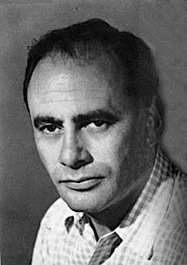
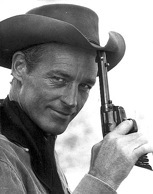
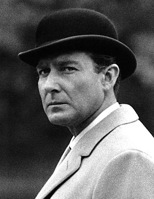

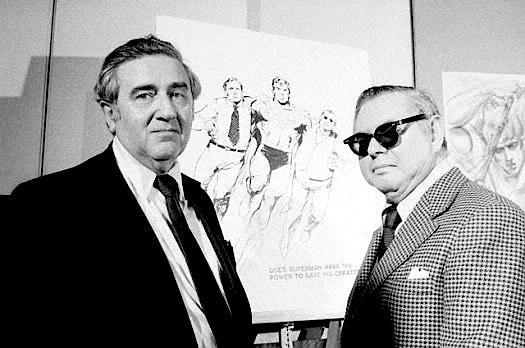

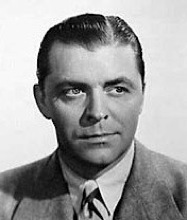

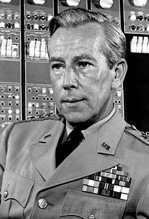
Jerry Siegel, left, and Joe Shuster in 1977.

